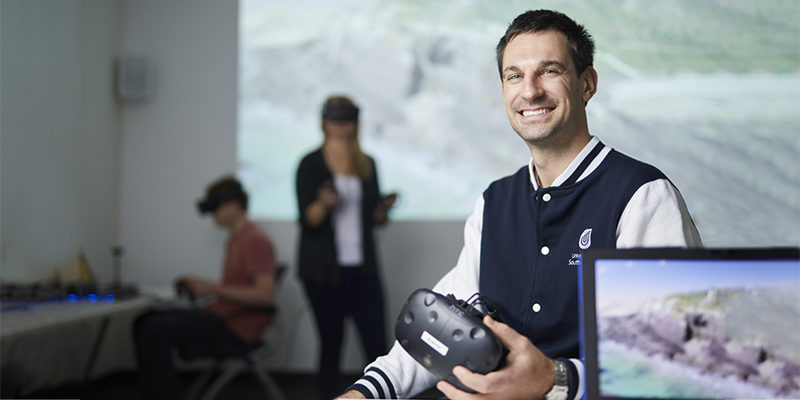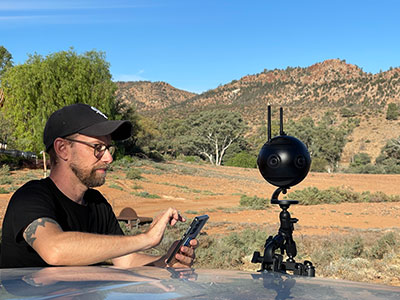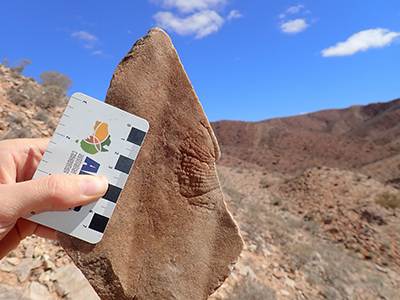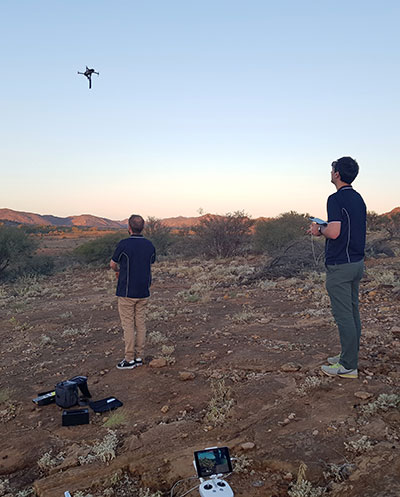Flinders Ranges virtual tourists to be ‘teleported’ into the deep past for World Heritage bid
By Candy Gibson
 TECHNOLOGY AND ENGINEERING UniSA’s Project LIVE team is led by Associate Professor Tom Raimondo.
TECHNOLOGY AND ENGINEERING UniSA’s Project LIVE team is led by Associate Professor Tom Raimondo.Sir David Attenborough has named it one of his favourite places on Earth – and the world will soon see why via an immersive virtual tour of the iconic Flinders Ranges.
 Capturing the 360-degree video.
Capturing the 360-degree video.UniSA geologist Associate Professor Tom Raimondo is virtually documenting the geoscientific significance of the 600-million-year-old landscape in support of the South Australian Government’s bid for World Heritage status.
The 360-degree tour will take viewers on a journey through deep geological time, illustrating why this ancient landscape has captured the world’s attention, not only for scientific reasons, but also for its rich Aboriginal and mining heritage.
Assoc Prof Raimondo says the virtual tour, to be created as part of UniSA STEM’s Project LIVE initiative, will showcase the remarkable diversity of the Flinders Ranges.
 Ediacaran fossil
Ediacaran fossil“It’s the best place in the world to witness the rise of animal life on Earth, preserved as the Ediacaran fossils that were first discovered by Reg Sprigg in 1946 and are now our state fossil emblem,” Assoc Prof Raimondo says.
“The story of life began in the Flinders Ranges, and its rocks are like the pages of history for us to read.”
The scale and grandeur of this ancient landscape will be revealed by 3D fly-throughs that will allow users to get a bird’s-eye view of Ikara (Wilpena Pound), discovering how it was formed by massive deforming forces.
“The action doesn’t stop there – we’re going to show users how a giant asteroid slammed into South Australia some 580 million years ago, leaving a crater at Lake Acraman and depositing debris over 300 kilometres away in Bunyeroo Gorge.
“Then from fire to ice we’ll reveal the how the Earth went into a deep freeze and glaciers began slowly and inexorably shaping the hills and valleys, leaving behind unmistakeable evidence of their journey across the landscape,” Assoc Prof Raimondo says.
A separate theme will document the fossil geothermal site at Arkaroola, perhaps the longest active geothermal region anywhere on Earth, where users will explore Paralana Hot Springs and Mount Gee.
The region’s mining history will also be featured, with users taken on a journey deep underground at the Blinman Heritage Mine, discovering the harsh realities of mining life for many early settlers, but also the economic boom that copper brought to South Australia for the best part of a century.
“We’re keen to show how the early exploration for copper mineralisation pioneered in the Flinders Ranges ultimately led to uncovering one of the largest copper, uranium, gold and rare earth element deposits in the world at Olympic Dam,” he says.
 Using a drone to capture 360-degree video.
Using a drone to capture 360-degree video.The virtual reality project is in its initial phase and will take two years to complete, meeting the deadline that UNESCO has given the SA Government to support its claim for the Flinders Ranges to be listed as a World Heritage site.
In April it was given tentative status, bringing it one step closer to joining global icons such as Yosemite National Park and the Galapagos Islands on the World Heritage register.
The Flinders Ranges project is the latest virtual tour developed by UniSA’s Project LIVE, following in the wake of Beyond the Ice, a gamified geological expedition of Hallett Cove, which became an international hit, accessed by users from 57 countries.
Phase 1 of the project has been funded by generous private donations, and the Project LIVE team is actively seeking further support to expand to Phase 2 and engage stakeholders from across the environmental, mining, tourism and heritage sectors.
“UniSA’s expertise in the virtual and augmented reality space allows us to capture such iconic, world-class field sites in a really engaging, entertaining and educational way,” Assoc Prof Raimondo says.
“We see this virtual tour as the perfect vehicle to bring the Flinders Ranges to a global audience, show everyone what a special place we live in, and in doing so, maximise the benefits and economic opportunities available to this region by celebrating its truly world-class geology and palaeontology.”
Other Stories
- Don’t worry, the kids are cool if you cash in on their inheritance
- Flinders Ranges virtual tourists to be ‘teleported’ into the deep past for World Heritage bid
- Do vegan diets make kids shorter and weaker?
- Could genetics hold the key to preventing SIDS?
- Achievements and Announcements
- Companies which pay scant attention to psychological health put staff at higher risk of depression
- Conserving coastal seaweed: a must have for migrating sea birds
- Video: How to understand and be understood
- Students gain international experience without leaving home
- How a UniSA student became the face of Adelaide youth lifestyle platform
- The latest books from UniSA researchers
- In Pictures: Camp Adelaide in Guangzhou and UniSA Sport winners




